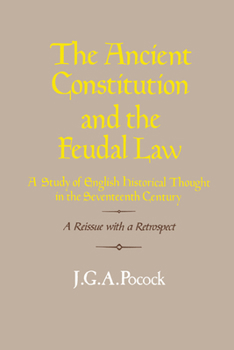The Ancient Constitution and the Feudal Law: A Study of English Historical Thought in the Seventeenth Century
Select Format
Select Condition 
Book Overview
Professor Pocock's subject is how the seventeenth century looked at its own past. In the sixteenth and seventeenth centuries, one of the most important modes of studying the past was the study of the law - the historical outlook which arose in each nation was in part the product of its law, and therefore, in turn of its history. In clarifying the relation of the historical outlook of seventeenth-century Englishmen to the study of law, and pointing out its political implication, Pocock shows how history's ground was laid for a more philosophical approach in the eighteenth century.
Format:Paperback
Language:English
ISBN:052131643X
ISBN13:9780521316439
Release Date:April 1987
Publisher:Cambridge University Press
Length:424 Pages
Weight:1.46 lbs.
Dimensions:1.0" x 6.0" x 9.1"
Customer Reviews
1 rating
Interesting
Published by Thriftbooks.com User , 15 years ago
An interesting early book by the great historian of ideas JGA Pocock. This book focuses on what Pocock calls the history of historiography in 17th century England. Pocock is concerned mainly with reconstructing how 17th century intellectuals thought about their past. This apparently recondite topic turns to have a number of interesting dimensions. Pocock begins with a surprising and interesting fact, that something prefiguring historical analysis emerged from the study of legal traditions. This occurred first in 16th century France, where the emerging methods of humanist textual criticism were applied to legal traditions. The existence of different legal traditions in France led several scholars to discover the dynamic quality of legal history, the discovery of feudalism, and reconstruction of legal history in the context of a form of social history. In England, where the common law tradition had no competitors, the evolution of knowledge followed a different course. The common lawyers, epitomized by the great Edward Coke, projected the common law and contemporary English political institutions back into an immemorial past as a permanent feature of English life. This treatment of English legal history was entangled in efforts to resist James I assertions of royal power. Subsequent scholars, notably the great antiquarian Henry Spelman, partly inspired by French scholars, subsequently discovered the changing nature of English law, discovered feudal law, and made inferences from legal history to imaginative and insightful reconstructions of medieval English society. Pocock evinces particular symppathy for Spelman's efforts to elucidate non-anachronistic understandings of key terms and concepts, an activity very similar to Pocock's own scholarly goals. Pocock traces the influence of Spelman's discoveries on subsequent scholars and how these reconstructions of English history were entangled in 17th century politics. This book concludes with a nice chaper on the treatment of English history following the Glorious Revolution, describing the emergence of the Whig version of English history and looking forward to the work of important 18th century historians like Robertson and Hume. Like of all of Pocock's work, this book is characterized by close analysis of the texts, Pocock's impressive erudition, and clear writing.






